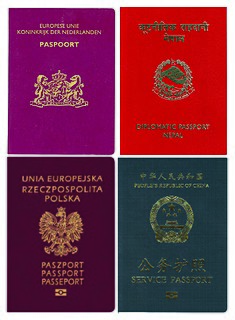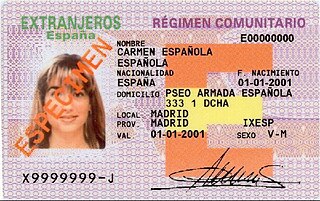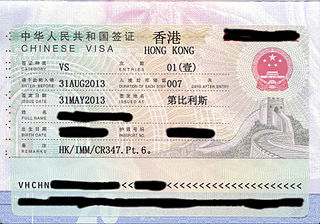
A passport is an official governmental document that contains a given person's identity. It helps its holder travel under its protection to and from foreign countries. The document certifies the personal identity and nationality of its holder. Standard passports contain the full name, photograph, place and date of birth, signature, and the expiration date of the passport.

Permanent residency in Canada is a status granting someone who is not a Canadian citizen the right to live and work in Canada without any time limit on their stay. To become a permanent resident a foreign national must apply to Immigration, Refugees and Citizenship Canada (IRCC), formerly known as Citizenship and Immigration Canada, under one of several programs. In addition to the conferred right of abode in Canada, a primary benefit of permanent residency is the eligibility to apply for Canadian citizenship after a certain period of permanent residency.

British National (Overseas), abbreviated BN(O), is a class of British nationality associated with the former colony of Hong Kong. The status was granted by voluntary registration to Hong Kong residents who had been British Dependent Territories citizens (BDTCs) before the transfer of sovereignty to China in 1997. Acquisition of BN(O) status was limited to the 10-year period preceding the transfer as a transitional arrangement for colonial subjects; current residents cannot newly register for this nationality.
The right of abode is an individual's freedom from immigration control in a particular country. A person who has the right of abode in a country does not need permission from the government to enter the country and can live and work there without restriction, and is immune from removal and deportation.

The right of abode (ROA) is an immigration status in the United Kingdom that gives a person the unrestricted right to enter and live in the UK. It was introduced by the Immigration Act 1971 which went into effect on 1 January 1973. This status is held by British citizens, certain British subjects, as well as certain Commonwealth citizens with specific connections to the UK before 1983. Since 1983, it is not possible for a person to acquire this status without being a British citizen.

The Republic of China national identification card, commonly known as the national identification card of Taiwan, is a compulsory identity document issued to people who hold both nationality and household registration in Taiwan. The National Identification Card served as the evidence for the household registration in Taiwan which grants the holder the right of abode and full civil and political rights in Taiwan. The card is used for virtually all other activities that require identity verification within Taiwan such as opening bank accounts and voting.
A travel document is an identity document issued by a government or international treaty organization to facilitate the movement of individuals or small groups of people across international boundaries, following international agreements. Travel documents usually assure other governments that the bearer may return to the issuing country, and are often issued in booklet form to allow other governments to place visas as well as entry and exit stamps into them. The most common travel document is a passport, which usually gives the bearer more privileges like visa-free access to certain countries. However, the term is sometimes used only for those documents which do not bear proof of nationality, such as a refugee travel document.

The Exit & Entry Permit for Taiwan, Republic of China is the document for the bearer to enter and/or depart Taiwan. Currently, there are several types of Exit & Entry Permit that reflect the bearer's residency status. The permit is issued by the National Immigration Agency of Taiwan. For different purposes, the permit is also known as

European Economic Area (EEA) citizens have the right of free movement and residence throughout the EEA. This right also extends to certain family members, even if they are not EEA citizens. A Residence card of a family member of a Union citizen is issued to the family member to confirm this right of residence. The holder of a valid Residence Card is entitled to use this document in lieu of an entry visa for entry to all EEA member states. There is not a unified format for this card throughout the EU.

Taiwanese nationality law details the conditions in which a person is a national of the Republic of China (ROC), commonly known as Taiwan. Civil and political rights usually associated with citizenship are tied to an ROC national's domicile, determined by whether they have household registration in Taiwan.

Visitors to the Republic of China (Taiwan) must obtain a visa or authorization in advance, unless they come from one of the visa exempt countries or countries whose nationals are eligible for visa on arrival. All visitors must hold a passport valid for 6 months.

A Resident Certificate is the identity document issued to long-term or permanent residents of the Taiwan area of the Republic of China who do not have Household registration in Taiwan. In Taiwanese laws, all nationals with household registration are issued a National Identification Card. The Resident Certificate is issued by the National Immigration Agency. Currently, there are several types of Resident Certificate that reflect the bearer's immigration status.

The Government of the Macau Special Administrative Region allows citizens of specific countries/territories to travel to Macau for tourism or business purposes for periods ranging from 14 to 180 days without having to obtain a visa. For other entry purposes, such as establishing residence on a long-term basis, a different policy applies.

The visa policy of Hong Kong deals with the requirements in which a foreign national wishing to enter Hong Kong through one of the 15 immigration control points must meet to obtain an entry permit or Visa, which depending on the traveller's nationality, may be required to travel to, enter, and remain in the Hong Kong Special Administrative Region. Visitors from over 145 countries are permitted without Visa entry for periods ranging from 7 to 180 days, to the Hong Kong Special Administrative Region for tourism or certain business-related activities. All visitors must hold a passport valid for more than 1 month.
A residence permit is a document or card required in some regions, allowing a foreign national to reside in a country for a fixed or indefinite length of time. These may be permits for temporary residency, or permanent residency. The exact rules vary between regions. In some cases a temporary residence permit is required to extend a stay past some threshold, and can be an intermediate step to applying for permanent residency.

The visa policy of Canada requires that any foreign national wishing to enter Canada must obtain a temporary resident visa from one of the Canadian diplomatic missions unless they hold a passport issued by one of the 54 eligible visa exempt countries and territories or proof of permanent residence in the United States.

Visitors to Georgia must obtain a visa from Georgian diplomatic missions unless they come from one of the visa exempt countries. or one of the countries whose citizens can obtain an e-Visa. Visitors must hold a passport valid for the period of intended stay, while Georgian citizens can enter with a valid or expired passport or identity card.

The British National (Overseas) passport, commonly referred to as the BN(O) passport, is a British passport for persons with British National (Overseas) citizenship. BN(O) citizenship was created in 1987 after the enactment of Hong Kong Act 1985. BN(O) citizens are permanent residents of Hong Kong who were British Dependent Territories citizens until 30 June 1997, and chose to remain British by registering for BN(O) citizenship when Hong Kong was under British administration.

The Re-entry Permit is a travel document similar to a certificate of identity, issued by the United States Citizenship and Immigration Services to U.S. lawful permanent residents to allow them to travel abroad and return to the United States. It is a passport-like booklet with a blue-green cover with the words "TRAVEL DOCUMENT" on the front. Individuals whose application for permanent residency has not yet been approved can instead apply for advance parole.

Georgian nationality law is the law governing the acquisition, transmission and loss of Georgian citizenship.















